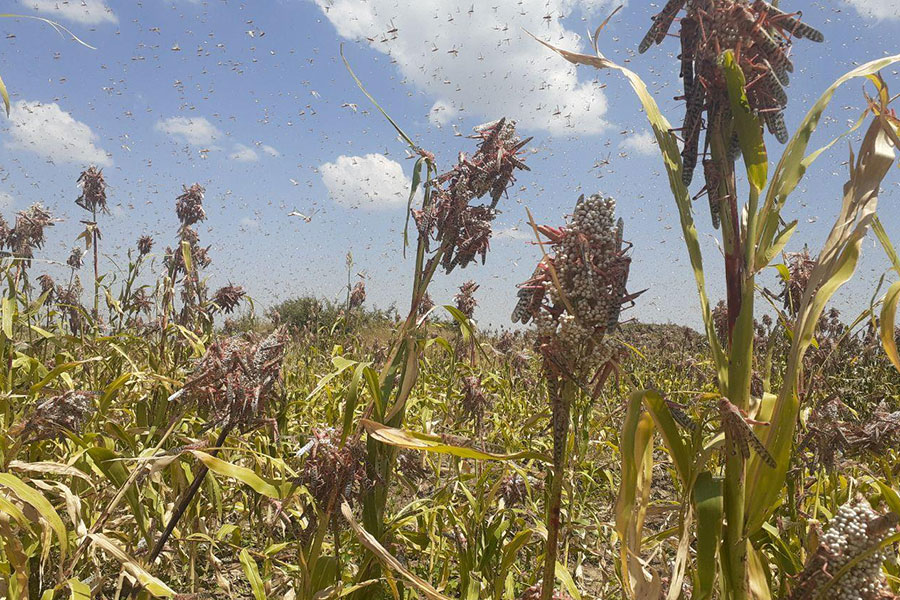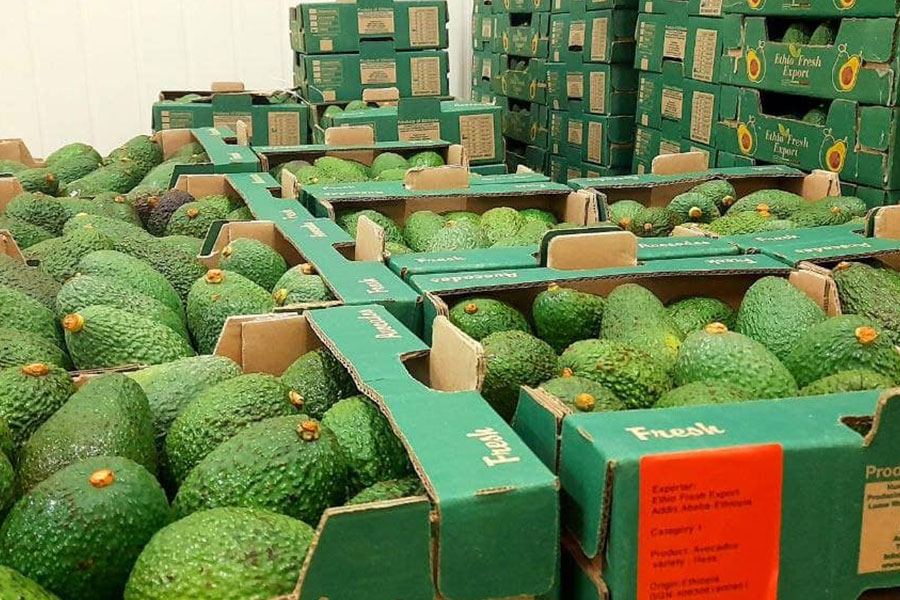
Jul 24 , 2021
By Habtamu Yesigat (PhD)
In Ethiopia and across much of sub-Saharan Africa, farmers are being sidelined as a result of a lack of a robust agro-processing industry that would turn raw materials into processed products with a longer shelf life. Government and private sector collaboration is key to strengthening this link, building rural economies, and generating jobs desperately needed for pandemic recovery, writes Habtamu Yesigat (PhD), Ethiopian agricultural development economist with extensive research experience in Africa and Europe, director of programmes for Precision Agriculture for Development and Aspen 2021 New Voices Fellow.
While traveling from Hawassa, currently a capital to both the Southern and Sidama regional states, to Addis Abeba last March, I met a tomato producer on the roadside looking for buyers. His regular trader had skipped travel to the farm to collect the harvest for the last two weeks. The farmer, therefore, set out to sell his tomatoes on the street and was worried that the harvest could be wasted.
This is the experience of most smallholder farmers. They have little knowledge about the market situation when they make production decisions. Disconnected from the market, they rely on the middle-person; there is no processing plant that they know of; and in the end, they are hit with low prices and a lack of market outlets. Meanwhile, instead of local brands, expensive processed food imports line many supermarket shelves. Perhaps unsurprisingly, I had an imported brand of tomato paste for a snack in my backpack as I talked with the farmer.
In Ethiopia and across much of sub-Saharan Africa, farmers are being sidelined in a dysfunctional agricultural system with a weak link: lack of a robust agro-processing industry that would turn raw materials, such as tomatoes, into a processed product, such as tomato paste, with a longer shelf life. Such an industry would purchase locally, absorb large harvests, and ensure farmers a market. Government and private sector collaboration is key to strengthening this link, building rural economies, and generating jobs desperately needed for pandemic recovery.
Indeed, the COVID-19 pandemic makes the situation even more urgent. Even a few weeks of travel restrictions could depress agricultural trade, lead to lower prices for the farmer and drive-up food prices for urban consumers, according to Farmers Weekly. Indeed, between January 2020 and June 2021, global food prices rose 40pc. The number of people facing acute food insecurity and needing urgent assistance hit a five-year high in 2020. Small-scale farmers who are stuck with spoiled or unsold harvests are among those most affected. The post-harvest loss in tomatoes in Dire Dawa, for instance, accounted for about 45pc of the total production, according to a study conducted in 2018. Ethiopia and many African economies are predominantly agrarian, and such losses impact the larger economy.
Countries are hit with a double burden. On the one hand, farmers’ produce is left unsold or sold for pennies. On the other hand, there is no adequate supply of fresh and processed agricultural products in the market. At the same time, many countries import food products.
This begs the question: if the demand for processed agricultural goods is there, what hinders private sector development?
Companies are put off by the challenges: fragmented production, low and variable quality raw materials, and underdeveloped transport. This all adds up to extremely high risk for every dollar invested. And it presents this dilemma: unless there is an adequate supply of standardised farm products, quality grading systems, and a functional infrastructure, the private sector will not find agro-processing an attractive business proposition.
Farmers, on the other hand, will not find large-scale production feasible as long as they continue to rely on the existing unreliable market conditions.
There is a way out. Government co-investments with the private sector could lower risk. Co-investments that support coordination between businesses and farmers would be particularly effective. Governments could help farmers to organise and produce more as a group, provide timely and reliable market information, and support contract farming activities. In addition, this coordination activity would support standardised quality and adequate supply of agricultural products for processing plants.
Public-private partnerships in agro-processing are already proving their worth. For example, Ghana attracted over 37 million dollars in private funds through a provision of numerous incentives for Ghana Rubber Estates. The government supported this initiative through the development of infrastructures and facilities (construction of farm and feeder roads), activities to help farmers (credit provision, contractual agreements, subsidised insurance and an income protection fund in case of low rubber market prices), and actions to support businesses (guarantee for quality raw material, tax breaks).
Recently, a public-private partnership between the Kebbi State government in Nigeria and GBfoods established a 48 million dollar tomato processing factory. In its first three years, the tomato factory has contributed to improved incomes for smallholder farmers that supply fresh tomatoes to the processing factory. Farmers were provided with improved seeds, fertilisers, training and irrigation pumps.
Selling a few tomatoes at a time on the roadside is a recipe for poverty. Well thought out, designed and executed public-private partnerships that build agro-processing capacity would allow farmers to earn, save and invest more and put affordable local brands on grocery shelves. If Africa wants to achieve food security, enable its farmers to prosper, and generate jobs, governments and companies should invest in public-private partnerships that forge unbreakable links between farmers and markets.
PUBLISHED ON
Jul 24,2021 [ VOL
22 , NO
1108]


Commentaries | Nov 30,2019

Fortune News | Jul 21,2024

Radar | Jan 03,2021

Commentaries | Feb 12,2022

Agenda | Oct 17,2020

Featured | Oct 30,2021

Viewpoints | Apr 16,2022

Fortune News | Jul 10,2020

Radar | Jul 02,2022

Commentaries | Jan 22,2022

Photo Gallery | 177989 Views | May 06,2019

Photo Gallery | 168197 Views | Apr 26,2019

Photo Gallery | 158940 Views | Oct 06,2021

My Opinion | 137038 Views | Aug 14,2021
Commentaries | Oct 25,2025

Dec 22 , 2024 . By TIZITA SHEWAFERAW
Charged with transforming colossal state-owned enterprises into modern and competitiv...

Aug 18 , 2024 . By AKSAH ITALO
Although predictable Yonas Zerihun's job in the ride-hailing service is not immune to...

Jul 28 , 2024 . By TIZITA SHEWAFERAW
Unhabitual, perhaps too many, Samuel Gebreyohannes, 38, used to occasionally enjoy a couple of beers at breakfast. However, he recently swit...

Jul 13 , 2024 . By AKSAH ITALO
Investors who rely on tractors, trucks, and field vehicles for commuting, transporting commodities, and f...

Oct 25 , 2025
The regulatory machinery is on overdrive. In only two years, no fewer than 35 new pro...

Oct 18 , 2025
The political establishment, notably the ruling party and its top brass, has become p...

Oct 11 , 2025
Ladislas Farago, a roving Associated Press (AP) correspondent, arrived in Ethiopia in...

Oct 4 , 2025
Eyob Tekalegn (PhD) had been in the Governor's chair for only weeks when, on Septembe...

Oct 25 , 2025 . By YITBAREK GETACHEW
Officials of the Addis Abeba's Education Bureau have embarked on an ambitious experim...

Oct 26 , 2025 . By YITBAREK GETACHEW
The federal government is making a landmark shift in its investment incentive regime...

Oct 27 , 2025
The National Bank of Ethiopia (NBE) is preparing to issue a directive that will funda...

Oct 26 , 2025 . By SURAFEL MULUGETA
A community of booksellers shadowing the Ethiopian National Theatre has been jolted b...